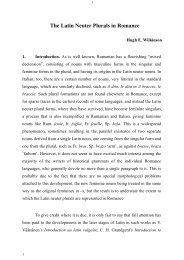THE STRONG PERFECTS IN THE ROMANCE ... - Page ON
THE STRONG PERFECTS IN THE ROMANCE ... - Page ON
THE STRONG PERFECTS IN THE ROMANCE ... - Page ON
You also want an ePaper? Increase the reach of your titles
YUMPU automatically turns print PDFs into web optimized ePapers that Google loves.
form the weak perfect in these and other verbs. However, the evidence is<br />
almost conclusive beyond doubt that these vowels were substituted for an<br />
earlier e to avoid confusion with the imperfect which is, unusually, formed<br />
in e, and that their origin is to be found in fui, fost, fo etc. (see below, §32).<br />
One piece of evidence for this is that in the areas bordering Languedoc,<br />
where -ia survives in the imperfect, the original e is found in the perfect. In<br />
the case of this class of verbs, as in Provençal, the forms derived from the<br />
Latin -ui perfect have a g in the older language (the modern language has<br />
re-formed the perfect on the present stem), and those without this<br />
distinguishing mark may be presumed in all likelihood to have come from<br />
forms without Latin u, even if the ending in Gascon contains o or u. Thus<br />
examples of Latin -ui perfects are 1 pogui, 3 pogo, subj. pogos/pogues (and<br />
also 3 poscoc, subj. poscossen, modern pouscoui, as Provençal), 3 plago, 6<br />
plagon, 3 mogo, 6 mogon, subj. magos/moguos, 1 aguy, 2 agust, 3 ag/ago,<br />
6 hagro/hagon, subj. agos, 3 dego, subj. degues/degos, 1 (ar)thiencu, 3<br />
tenc/tengo, 6 tengo(re)n, subj. tengos, 1 binc/viencu, 3 venco/bingo, 6<br />
bengeren/convengoren, subj. vengos, subj. valgossen, 3 bolg/bolge/bougo,<br />
6 volgoren, subj. bolgos, 6 comparegoren; p.ps. pogut, yagut, plagut,<br />
mogut/magut, agut, degut, tingut/contengut, vengud/biengut, balgut, bougut.<br />
Here it will be seen that there are a few early strong forms, as ag, hagro,<br />
but most of the forms have added to them the new arrhizotonic o or u<br />
endings, or, in a few cases, e, as in bengeren, bolge. Forms without Latin u<br />
are podessem, podesen, podo, podora, podos, movessen, havo, sabo, sabom,<br />
sabora, sabossi, balos, valossan, volu/boluy, bolt (Dar., p. 44)/volo,<br />
voloren/volon, bolossen/bolessan, paros, with p.ps. podut, aut, sabut,<br />
volut/bolut. It will be seen that, as in the case of Provençal, the majority of<br />
verbs have -g- forms; those that have others have them in addition to the<br />
-g- forms, with both sets of forms occurring throughout the paradigm, as in<br />
French, with the exception of saber. In the case of this verb and the -cipere<br />
28









